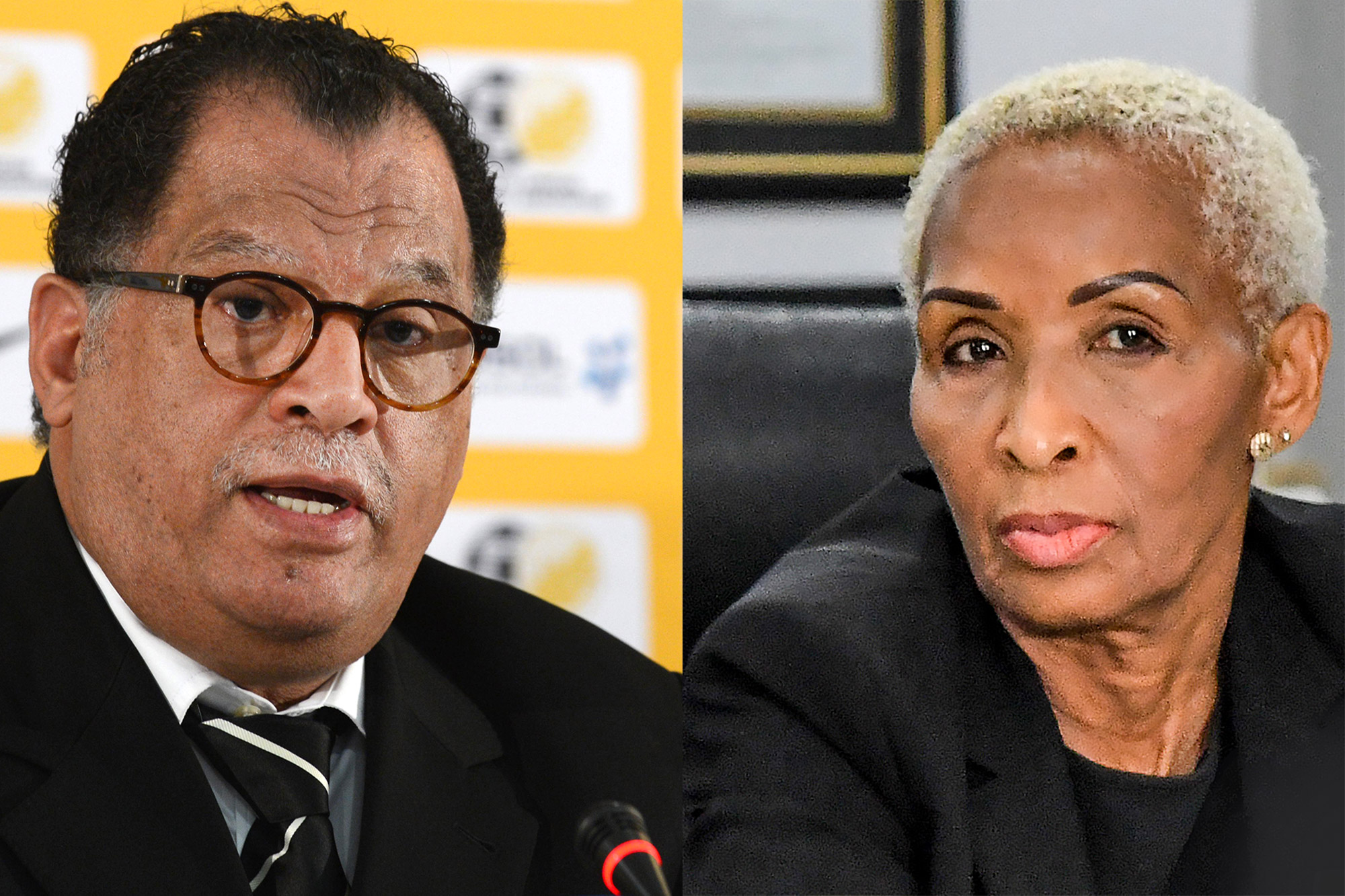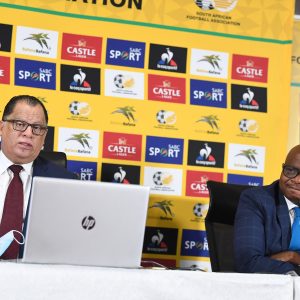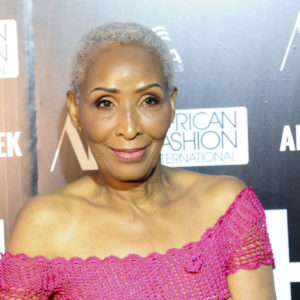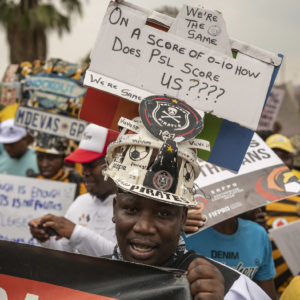Safa needs reforms, not simply a new leader
Regardless of who is elected president of South Africa’s football governing body on 25 June, the issues plaguing the game will persist because the leading candidates are part of the problem.
Author:
22 June 2022

To paraphrase French football legend Eric Cantona, having to choose between Danny Jordaan and Ria Ledwaba in the election for the presidency of the South African Football Association (Safa) is like choosing between cholera and the plague. Solly Mohlabeng might also be in the race as the third and final candidate, but the real battle will be between Jordaan, the current president, and Ledwaba, his deputy.
And that isn’t likely to be much of a battle: Jordaan looks set to be elected for a third term because the way the elections are structured favours the incumbent. The association’s five-member governance committee only announced the eligible candidates on 6 June, giving them just 18 days to campaign before the votes are cast on 25 June at the Sandton Convention Centre in Johannesburg. And the date was brought forward from the initial date in August.
Before the announcement of the eligible candidates, no one was allowed to campaign. This resulted in Ledwaba being forced to cancel a press conference at the 11th hour as going ahead would have risked her presidential candidacy.
Related article:
But in actual fact, no one except Jordaan was allowed to campaign before 6 June. City Press reported in May that cash-strapped Safa had awarded its national executive members R20.8 million in honoraria, which amounted to each of the 40 members pocketing R520 000. This was a clear election ploy. Two years ago, Safa wrote off an amount of close to R50 million that it owed its regions because of its desperate financial position. Its technical directors, Fran Hilton-Smith (who left in 2019) and Neil Tovey (who left in 2020), still haven’t been replaced. Defending the honorarium payments, Safa made the lame excuse that paying an “honorarium is a constitutional matter” and it has been paid “over the last 31 years”.
There is clearly a governance issue at Safa House when it pays individuals for essentially volunteering, because that is what being a national executive committee member entails. Yet their payment seems to rank higher than ensuring that the people breathing life into the game in the amateur structures are compensated.
Jordaan has been heavily criticised by his former colleagues. Former chief executives Dennis Mumble and Gay Mokoena have accused Jordaan of corporate governance violations. The two penned strongly worded letters that highlighted how the Safa president had essentially become a dictator. In her book Fran: A Song For Banyana, Hilton-Smith slammed Jordaan, saying “his style of ‘leadership’ consisted of shouting a lot and trying to intimidate people”.
These revelations haven’t done much to shake Jordaan’s iron grip on power. A number of the regions still back him and it would take a miracle for him to lose these elections. Should that miracle happen and Ledwaba win, it wouldn’t be a new dawn like she claims.
Poor track record
The Safa vice-president, who was a national executive committee member before that, is part of the problem. She has been in the Safa hierarchy for the past decade – the very hierarchy that defended Jordaan when the Safa president was accused of rape. Ledwaba’s name was among those put forward to speak at a bizarre press conference that sought to highlight Jordaan’s achievements as a response to the rape accusations. She didn’t show up, but she also said nothing about being named as one of the speakers.
She stunned many in 2005 with a verbal attack on Banyana Banyana players, saying they “need to learn how to be ladies. At the moment you sometimes can’t tell if they’re men or women.” She was the chairperson of Safa’s women’s committee when she said this. Instead of dismantling the high pay disparity between women and men at national team level, Ledwaba was more concerned with how Banyana Banyana players look and even suggested that they be sent to etiquette classes.
The gains women’s football has made are mainly as a result of the players elevating Banyana Banyana to the point where sponsors are slowly seeing their worth. People like Jordaan and Ledwaba haven’t done much to improve things – in fact, the women’s game has grown in spite of them.
Related article:
The problem isn’t only Jordaan, but the people who have allowed him to stay in power since he ascended to the presidency in 2013. The accusations that Mumble and Mokoena have brought against Jordaan require scrutiny, not a reward. Simply replacing him, though, isn’t going to help if the person who takes over comes from his school of thinking.
We saw first-hand in the Confederation of African Football (CAF) that replacing a dictator isn’t enough. Madagascar’s Ahmad Ahmad promised much when he beat Issa Hayatou in 2017 for the CAF presidency, replacing the Cameroonian who had been at the helm for 29 years. Ahmad proved to be worse than Hayatou, damaging the organisation and facing numerous corruption allegations during his reign.
Taking back our football
The change needed to transform Safa goes beyond removing Jordaan. The lieutenants who stood beside him as he turned Safa into a one-man show must go with him – and Ledwaba is among them. The organisation needs serious reform if it is to change. It’s criminal that there is more determination to pay a few individuals than to plough money into football development.
As custodians of the game, Safa has a massive job in growing South African football. The legacy of apartheid can still be felt in sport, with not enough adequate infrastructure at grassroots level, especially in townships. When Bafana Bafana coach Hugo Broos slammed the quality of football in South Africa, most of the country reacted defensively instead of doing some introspection, slamming the Belgian for his “disrespect”.
Related article:
But the quality of football in the country is poor because not enough is invested in its early development. School football is dead. Safa pushed to manage it, taking it from the South African Schools Football Association. It did this not because it had a vision or wanted to change things, but because it wanted the sponsorship money from companies such as McDonald’s and Coca-Cola. There are many players who turn professional without having been properly coached, which means coaches at Premier Soccer League level and even at Bafana Bafana have to teach the basics that are taught in players’ early teens in other countries.
Broos’ words and the appalling choices on display in the Safa elections should be a wake-up call. South African football needs change, and that change won’t come from Safa House. It will come from other stakeholders – from supporters to footballers and administrators at amateur level – rolling up their sleeves and fighting to bring about that change. It’s those people who run the game, not the suits who will be at the Sandton Convention Centre on 25 June, where they will be voting to protect their interests instead of putting football’s interests first.



